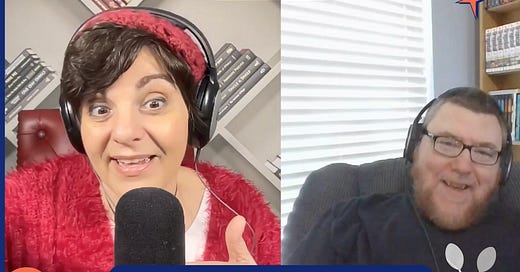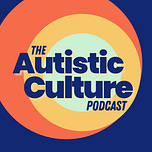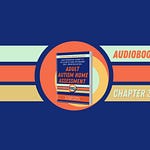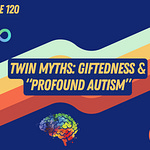An episode that's processing all the right ideas!
Here’s what’s in store for today’s episode:
In today’s advocacy episode, we tackle the beast that is internalized ableism. We all experience it—but how do we overcome it?
Due to the social model of disability, many autistic people say, "But I'm not disabled!"—when in reality, this is internalized ableism at work.
Our autistic meat bodies get exhausted just from processing stimuli and existing. The world is built for neurotypical survival—yet when we struggle, we’re met with, “Have you just tried suffering?”
There is nothing wrong with being disabled—but at the same time, a huge part of our success is out of our control and depends on access to accommodations.
It can be hard to find the balance between doing your best and pushing your limits through masking—which, while it may reveal what you're "capable" of, can also be utterly torturous.
Our hosts discuss the dangers of masking to your limits and how it inevitably leads to burnout.
Due to our bottom-up processing, we're constantly taking in way more information at once than neurotypicals. In Uno terms—it’s like we’re always drawing a Draw 4 card.
We dive into skill regression and how burnout can hit you like a freight train out of nowhere.
In this episode, Matt and Angela discuss internalized ableism, the dangers of masking, and how burnout and skill regression can hit unexpectedly.
Our hosts discuss mourning the opportunities, friendships, relationships, and job prospects lost when burnout hits.
We discuss the subtle discrimination that arises when neurotypicals judge us as lazy or perceive us negatively due to burnout, without understanding the crucial context of our disability.
Coming out of the neurocloset is so important, though it often comes with immense fear of being judged.
In addition to this, we discuss the right to privacy regarding one's diagnosis, considering the judgment from neurotypicals and the fact that certain states, like Indiana, have autism registries—leaving us uncertain about their intentions.
You might not even realize you're autistic until you have an autistic child or reach burnout. The world is definitely set up for neurotypicals, and many people don't realize they're not neurotypical until they examine the systems they've created for survival in a neurotypical-dominant world.
We talk about how internalized ableism fuels unnecessary infighting within the autism community, such as disputes over functioning labels and levels.
Matt and Angela discuss non-speaking autism and how, contrary to neurotypical opinions, AAC devices actually facilitate speech rather than prevent individuals from ever learning to speak.
Guess what? Highly Sensitive Persons (HSPs) are actually often just autistic, with it being a rebrand of Asperger's, especially among women.
Internalized ableism is often passed down through your autistic lineage, creating patterns that you need to actively work to break. You may slip up and engage in ableist behavior, but it’s important to recognize that and know how to address it within yourself.
Angela and Matt talk about their own autistic children and how, for them, doing the work against internalized ableism means making the world better and safer for their kids, while advocating for them.
We talk about autistic pride and how important it is—be proud that you're a zebra, and don't let the world beat you up for not being a horse!
The more you learn about your own needs, the more leeway you can give yourself—whether it’s wearing big sunglasses, turning off the bright lights, using the little spoon, or whatever else helps you thrive.
Accommodating yourself and learning more about your own needs is one of the best ways to combat internalized ableism, build a happy, healthy autistic life, and advocate for the community as well.
“Due to the social model of disability, we autistic people are disabled. And if you say, ‘but I am autistic and I am not disabled’, then that actually is the internalized ableism.” - Matt
“When you think, ‘everyone else can do this, why can’t I?’ - it’s the same as a person in a wheelchair saying, ‘everyone else can use the stairs. Why can’t my legs work?” - Matt
“It requires a certain amount of therapy & personal exploration to identify, ‘what are my actual limits?’ Like, where am I disabled? What are my things, versus where should I maybe not be giving up so quickly on certain things?” - Angela
“Every machine has limits. A bulldozer can push more than a Camaro. And if you try to make a bulldozer act like a Camaro or vice versa, it’s going to damage either machine.” - Matt
“For me, the booby prize of having a major burnout episode is that I can’t - I literally can’t do it anymore. And I’m like, ‘where did it go? I used to be able to do that. Where did it go?’” - Angela
“Neurotypicals look at [burnout] and say, ‘wow, how lazy of him not to be at work for a month. There must be something wrong with him. He must be crazy.’ And then there’s all sorts of discrimination based on that.” - Matt
“We can’t come out of the neurocloset and be ourselves if we can’t be publicly proud of who we are. We’re going to judge ourselves based on this artificial standard. Because if they’re going to judge us, we say, ‘then in that case, there’s a reason that they’re judging me.’ Because again, we’re very reason-oriented people. We have the data, we have the logic. And it’s incredibly hurtful to carry around this guilty secret that we can’t say to people.” - Matt
“We are the autistic culture. We come from a long line of autistic people. We see the traits better than a lot of neurotypical people with many degrees. We live the life. We know what it is. And we are people, same as any other. We’re not worse than other people. We’re not better than other people.” - Matt
“Don’t be so judgmental - of yourself, or others. And I think you’ll live a longer, happier life.” - Matt
Did you enjoy this episode? We dive deep into internalized ableism, the challenges of burnout, and how masking can lead to exhaustion. We also touch on the importance of autistic pride and how to accommodate yourself for a healthier, happier life. In the comments, let us know what resonated with you, and use #AutisticCultureCatch to share your thoughts on social media and connect with other listeners!
Related Episodes:
Follow us on Instagram
Find us on Apple Podcasts and Spotify
Learn more about Matt at Matt Lowry, LPP
Join Matt’s Autistic Connections Facebook Group
Learn more about Angela at AngelaKingdon.com
Angela’s social media: Twitter and TikTok
Our Autism-affirming merch shop















Share this post